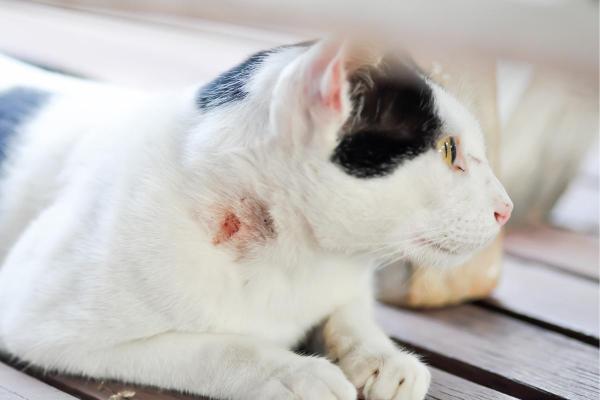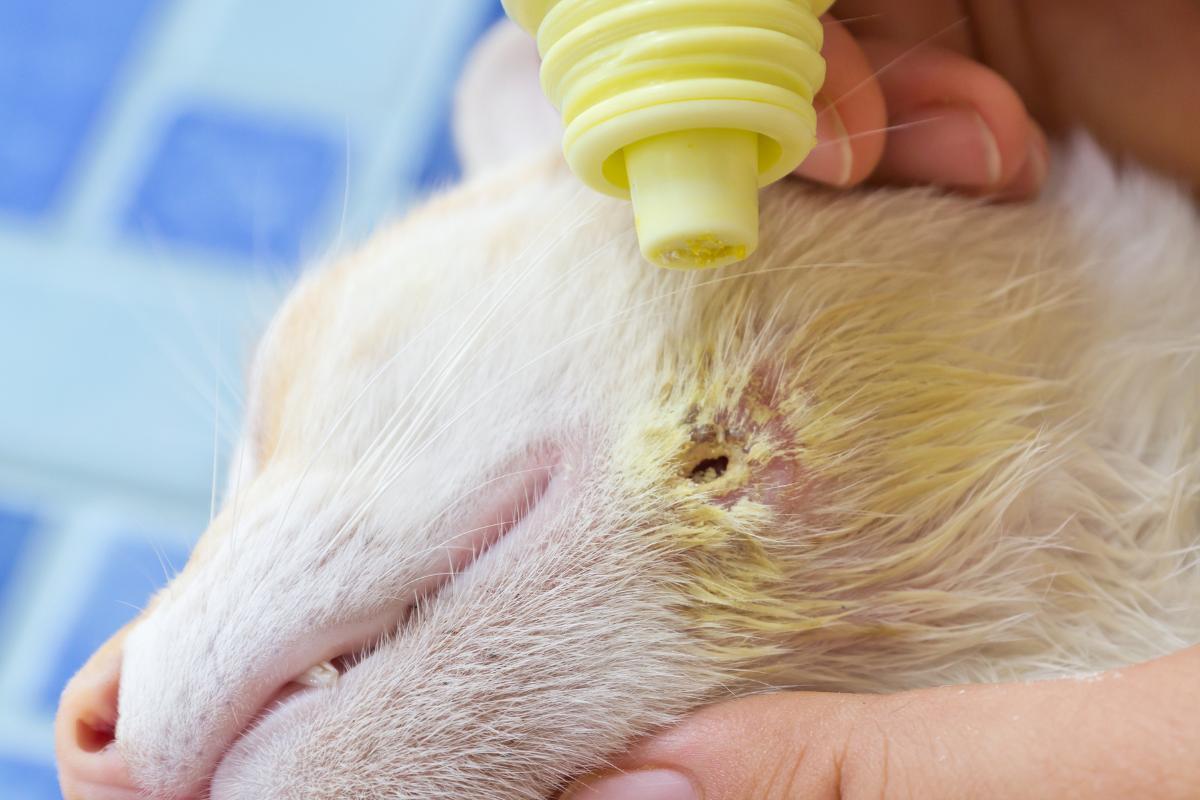Can a Cat Die from an Abscess?



See files for Cats
Abscesses in cats are painful accumulations of pus that result from bacterial infections. When an abscess forms, the body encapsulates the pus in connective tissue to contain the infection and prevent it from spreading. However, if bacteria or microorganisms escape into the bloodstream, it can pose a serious threat to your cat's health and even be life-threatening if not treated promptly. Understanding abscesses is crucial for ensuring your cat’s well-being.
To learn more about how to identify, treat, and manage abscesses in cats, and whether a cat can die from an abscess, continue reading this AnimalWised article.
Can a cat die from an abscess?
Yes, a cat can die from an untreated abscess if the infection spreads. Abscesses are pockets of pus that form in tissue cavities as the body’s defense mechanism to contain an infection. This pus, made up of inflammatory cells, dead microorganisms (typically bacteria like Escherichia coli, staphylococci, or Clostridium), and tissue debris, is encapsulated by connective tissue in the affected area.
Although abscesses often occur on the skin, they can form in internal organs as well, making them invisible to the naked eye.
Outdoor cats or those that have access to the outdoors are especially prone to abscesses due to their natural tendency to bite, scratch, or injure themselves during interactions with other animals or rough surfaces. These injuries can easily become infected if not properly treated, leading to abscesses.
Moreover, cats are at risk of contracting serious infections like feline leukemia or feline immunodeficiency, which can further weaken their immune systems and make abscesses more dangerous. Left untreated, an abscess can allow the infection to spread throughout the body, leading to potentially fatal consequences.
Causes of abscesses in cats
While wounds are the most common cause of abscesses in cats, they can also result from other sources, such as periodontal disease, bacterial or viral infections, and even the inhalation of foreign particles that carry microorganisms into the lungs.
If the infection spreads into the bloodstream, a condition known as septicemia, it can affect vital organs like the liver or kidneys. Uncontrolled abscesses or the resulting complications from systemic infections can be life-threatening.
Proper medical treatment is essential to prevent the infection from spreading and to safeguard the cat’s health.
If you’re interested in preventing severe issues from abscesses, you’ll also want to learn about the various causes of cat wounds and how to care for them.

How to tell if a cat has an abscess?
Determining if a cat has an abscess involves observing various signs and symptoms. Here’s how you can tell if your cat might have an abscess:
- Look for localized swelling or lumps on your cat’s body. Abscesses often appear as raised, warm, and painful areas under the skin. They can be found anywhere on the body but are most common on the legs, face, and tail.
- The affected area may appear red and feel warm to the touch. This is due to the inflammation and increased blood flow to the site of the abscess.
- Your cat may show signs of pain or discomfort when the affected area is touched. They might flinch, pull away, or react aggressively when you attempt to examine or touch the swollen area.
- A cat with an abscess might become more withdrawn or irritable. They may also avoid normal activities, such as grooming, playing, or interacting with you.
- If the abscess is located in the mouth, jaw, or near the throat, it may affect your cat’s ability to eat or chew, leading to a reduced appetite or refusal to eat.
- Abscesses can cause systemic symptoms such as fever, lethargy, or a general sense of being unwell. Your cat might be less active than usual or seem unusually tired.
- If an abscess ruptures or opens, you might notice pus or a foul-smelling discharge coming from the area. The discharge can be thick, yellow, green, or bloody.
- Your cat may excessively lick or scratch at the affected area. This behavior is often an attempt to relieve discomfort or irritation caused by the abscess.
Wondering about those mysterious lumps on your cat? Discover what they might indicate and how to handle them in our detailed guide.
What is a potential complication of an abscess?
Complications from abscesses can be severe and potentially fatal if left untreated. Here's a revised and improved version of the text:
Complications of abscesses include the potential for infection to spread, which can be either local or systemic. Systemic infection, if not managed promptly, can be fatal. The spread occurs when an abscess ruptures or when bacteria come into contact with the general circulation or surrounding tissues. This allows bacteria or microorganisms to migrate to nearby tissues or the bloodstream, where they can spread throughout the body. Once bacteria enter the bloodstream, the condition known as septicemia or sepsis can develop, posing a serious threat to the cat’s life if not treated swiftly.
Before reaching a fatal outcome, sepsis can cause several critical complications. These include:
- The infection can lead to a significant decrease in blood pressure, which reduces blood flow to vital organs.
- Small clots can form and impede blood flow, causing damage to vital organs.
- To compensate for the reduced blood pressure and blood flow, the heart works harder, which can lead to cardiac stress and weakening.
- Excess lactic acid builds up in the blood due to insufficient oxygen reaching tissues, further impairing organ function.
- The kidneys may fail to produce adequate urine, leading to a buildup of toxic waste products in the blood.
- Weakened blood vessel walls allow fluid to leak into surrounding tissues, causing swelling and further complications.
- Fluid accumulation in the lungs impairs breathing and oxygenation.
Finally, as blood clotting factors are depleted due to the ongoing formation of clots, a condition known as disseminated intravascular coagulation (DIC) can occur. This severe complication further exacerbates the cat’s condition and often leads to death if not treated immediately.
Will a cat abscess heal on its own?
A cat abscess may heal on its own in some cases, but relying on this outcome is risky and not advisable. As mentioned before, without intervention, an abscess can lead to serious complications. The infection can spread to surrounding tissues or enter the bloodstream, potentially causing severe conditions such as septicemia or sepsis.
Also, abscesses may eventually burst, releasing pus and bacteria into the surrounding tissues or environment, which can lead to further infection or complications. Even if an abscess does eventually rupture and drain on its own, it may take longer to heal without medical intervention. The abscess might not drain completely, leading to prolonged discomfort and risk of chronic infection.
Abscesses can be a symptom of underlying problems, such as bite wounds, periodontal disease, or other infections. Proper diagnosis and treatment of these underlying issues are crucial for effective healing. If you suspect your cat has an abscess, it’s important to seek veterinary care. A vet can properly diagnose the condition, perform necessary drainage if needed, and prescribe antibiotics or other treatments to manage the infection effectively.
Wondering how to effectively treat an abscess in your cat? Discover essential tips and what you can expect during the treatment process.
This article is purely informative. AnimalWised does not have the authority to prescribe any veterinary treatment or create a diagnosis. We invite you to take your pet to the veterinarian if they are suffering from any condition or pain.
If you want to read similar articles to Can a Cat Die from an Abscess?, we recommend you visit our Infectious diseases category.






